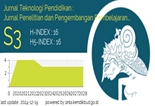Development of a Digital Learning Platform to Improve Math Problem Solving Skills
Abstract
Keywords
Full Text:
PDFReferences
Abdurrahman, Mulyono. (2003). Education for Children with Learning Difficulties. Jakarta: PT Rineka Cipta.
Al Hakim, M. F., & Azis, A. (2021). The role of teachers and parents: Challenges and solutions in online learning during the COVID-19 pandemic. History: Educational Journal of History and Humanities, 4(1), 16-25.
Alamsyah, N., Nengsih, R., & Nurrahmah, A. (2018). Differences in the Effect of the Revised Bloom Taxonomy Approach on Mathematics Problem Solving Ability in High and Low Learning Motivated High School Students. JIPMat, 3(2), 433818.
Bates, A. W., & Bates, T. (2005). Technology, e-learning and distance education. Psychology Press.
Buckingham, D. (2013). Beyond technology: Children's learning in the age of digital culture. John Wiley & Sons.
Burton, L. (1980). The teaching of mathematics to young children using a problem solving approach. Educational Studies in Mathematics, 11(1), 43–58. https://doi.org/10.1007/BF00369159
Darmawan Harefa, H. T. (2021). Audio Video Learning Media on Ability. Journal of Nonformal Education Science, 330.
Endang Mulyatiningsih, (2012). Applied Research. Yogyakarta: UNY Press.
Fanny, A. M. (2019, March). Analysis Of Pedagogical Skills And Readiness Of Elementary School Teachers In Support Of The Implementation Of The 2013 Curriculum. In International Conference on Bussiness aw and Pedagogy (Vol. 1, No. 1, pp. 59-63).
Hadisi, L., & Muna, W. (2015). Information technology management in creating a learning innovation model (e-learning). Al-TA'DIB: Journal of Educational Science Studies, 8(1), 117-140.
Husamah, Fatmawati, D., & Setyawan, D. (2018). OIDDE Learning Model: Improving Higher Order Thinking Skills Of Biology Teacher Candidates. International Journal of Instruction, 11(2), 249–264.
Jewitt, C. (2006). Technology, literacy and learning: A multimodal approach. Psychology Press.
Kurnia, G. (2015). Development of a Writing Skills Assessment Tool Using Cloud Computing Technology at High Schools in Bandung City. Indonesian Journal of Education, 1-11.
Lin, H. C., & Hwang, G. J. (2019). Research trends of flipped classroom studies for medical courses: A review of journal publications from 2008 to 2017 based on the technology-enhanced learning model. Interactive Learning Environments, 27(8), 1011-1027.
National Council of Teacher of Mathematics (NCTM). (2000). Curriculum and Evaluation Standars for School Mathematics, United States of America: The National Council of Teachers of Mathematics Inc.
Ningsih, Rita. Arfatin Nurrahmah. (2016). The Effect of Learning Independence and Parental Attention on Mathematics Learning Achievement. Formative 6(1) 73-84
Nunung Khafidotul Layali, M. (2020). Mathematical Problem Solving Ability through Treffinger Model in High School. Raflesia Journal of Mathematics Education, 138
Palennari, M., Lasmi, L., & Rachmawaty, R. (2021). Problem solving skills of students: a case study at SMA Negeri 1 Wonomulyo. Diklabio: Journal of Biology Education and Learning, 5(2), 208-216.
Redhana, I. W. (2019). Developing 21st Century Skills in Chemistry Learning. Journal of Chemistry Education Innovation, 13(1).
Sugiyarti, L., Arif, A., & Mursalin. (2018). 21st century learning in elementary school. Proceedings of the 2018 National Seminar and Discussion on Basic Education: 21st Century Learning, 439-444.
Sumartini, T. S. (2016). Improving students' mathematical problem solving skills through problem-based learning. Mosharafa: Journal of Mathematics Education, 5(2), 148-158.
Suryani, M., Jufri, L. H., & Putri, T. A. (2020). Analysis of students' problem solving ability based on initial math ability. Mosharafa: Journal of Mathematics Education, 9(1), 119-130.
Sutisna, A. (2016). Development of Blended Learning Model in Equivalency Education Package C Program in Improving Learning Independence. JTP-Journal of Educational Technology, 18(3), 156-168.
Utami, R. W., & Wutsqa, D. U. (2017). Analysis of mathematical problem solving ability and self-efficacy of public junior high school students in Ciamis Regency. Journal of Mathematics Education Research, 4(2), 166. https://doi.org/10.21831/jrpm.v4i2.14897
Via, Y. (2015). Improving Problem Solving Ability through the Development of Student Activity Sheets (LKS) with a Scientific Approach. Wahana, 64(1), 49-57.
Zubaidah, S. (2016). 21st century skills: skills taught through learning.
DOI: https://doi.org/10.33394/jtp.v10i2.15157
Refbacks
- There are currently no refbacks.
Copyright (c) 2025 Nova Yuliza, et.al

This work is licensed under a Creative Commons Attribution-ShareAlike 4.0 International License.
This Journal has been Indexed by:
Jurnal Teknologi Pendidikan
ISSN: 2656-1417 (Online)
ISSN: 2503-0620 (Print)
Published by Program Studi Teknologi Pendidikan, FIPP
Universitas Pendidikan Mandalika
Email: [email protected]

This work is licensed under a Creative Commons Attribution-ShareAlike 4.0 International License.















.png)






